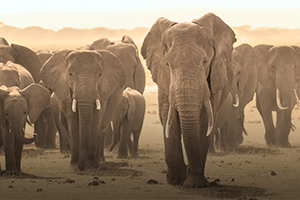Ancient Gene Combats Cancer
 One would expect that large and long-lived animals – such as elephants – would be more susceptible to cancer due to the fact that their cells need to divide many more times, paving the way for possible mutations. But it turns out that’s not the case. According to zoo necropsy records of elephants, less than 5 percent die from cancer, whereas in humans the estimates range up to 25 percent.
One would expect that large and long-lived animals – such as elephants – would be more susceptible to cancer due to the fact that their cells need to divide many more times, paving the way for possible mutations. But it turns out that’s not the case. According to zoo necropsy records of elephants, less than 5 percent die from cancer, whereas in humans the estimates range up to 25 percent.
Recently published research indicates that the gene responsible for this discrepancy is known as p53, an ancient gene found in all multicellular animals. The purpose of p53 is to detect cell damage and prevent further division until it has been repaired. In humans, one copy is inherited from each parent. However, at least 20 copies from each parent have been found in samples of African elephant blood.
In order to examine the effects of these higher concentrations, researchers exposed elephant cells to radiation, hypothesizing that they would more effectively repair DNA damage. But the results were just the opposite. In fact, the cells with damaged DNA were twice as likely to die, effectively killing off the cancer.
Once again, taking a lead from evolution and nature could have profound implications for new approaches to cancer prevention and treatment.
For information: Joshua Schiffman, University of Utah, Pediatric Administration, 295 Chipeta Way, Room 2S010, Salt Lake City, UT 84108; phone: 801-587-4745; email: Joshua.schiffman@hci.utah.edu; Web site: www.utah.edu